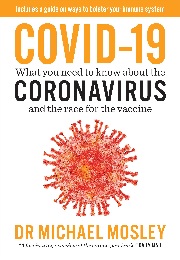COVID-19: What You Need to Know About the Coronavirus and the Race for the Vaccine

Michael Mosley
Short Books, £6.99
Science journalist and TV presenter Michael Mosley provides a brief and accessible introduction to what is currently known about COVID-19. Starting with a brief summary of the emergence of the virus, and some introductory virology, Mosley describes some key events in the first 100 days since the WHO were notified in late December 2019 about patients in China with a “pneumonia of unknown cause”.
Historical snippets about past disease outbreaks like SARS, MERS, Typhoid and the 1918 Flu help contextualise the knowledge of infectious disease, while reader friendly illustrations help to bring some of the discussions of mechanism on transmission and infection to life.
There is a chapter containing a “Q&A” on common questions that non-specialists may find useful, and Mosley outlines some factors that affect immunity, such as diet, sleep, stress, and physical activity. I confess to this section on immunity being a little close to ‘self-help’ style writing for my liking, but that may be my taste, and others can of course decide for themselves.
As the emerging knowledge about SARS-CoV-2 itself, its transmission, and disease treatment develops quickly, necessarily, some speculative parts of the book may require revision. For example, the conjecture that, “it now appears that cases of ‘re-infection’ were actually because of faulty testing”, already looks less-than-secure in light of multiple reports of reinfection, but such is the provisional nature of science, subject to revision considering new evidence.
There is not much new here for specialists, but for lay readers, or anyone looking for a summary of what is currently understood, it is a useful book. That it combines current knowledge with suggestions and personal tips, with accompanying illustrations, may make it a useful recommendation for a sceptical friend. Readers with a solid baseline in infectious disease will still find its chronology of the first 100 days of Covid-19 a handy reference, given how fast-moving the science is its useful to be able to signpost how far we've come in less than a year, at the time of writing.
The book ends on a positive note, considering that moving forward, beyond COVID-19, we might collectively evaluate many of our social behaviours, including travel, working practice, hygiene, climate change, and we may emerge with an increasing respect for the work of those in health and social care settings.
Conor McCrory MRSB


